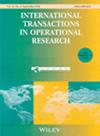在 FITradeoff 方法中结合整体评价和分解诱导进行偏好建模的分析问题
IF 3.1
4区 管理学
Q2 MANAGEMENT
引用次数: 0
摘要
在具有多重标准的决策过程中,将传统的分解诱导与整体评价相结合,是灵活互动权衡(FITradeoff)方法的一个独特方面,因为它融合了偏好建模的两种范式。尽管这种整合给决策过程带来了巨大的好处,但它也带来了一些影响,值得对该方法数学建模的一些分析方面进行深入细致的分析。整合这两种不同方案所获得的信息会对权重空间产生重大影响,可能会对结果产生显著影响。因此,本文着重于解决和研究 FITradeoff 方法的这些方面。我们深入分析了 FITradeoff 的属性和分析方面,以研究如何将整体判断的信息插入 FITradeoff 的数学模型,并确定这种整合的潜在影响,如定义偏好关系和识别潜在的最优替代方案。此外,我们还提出了一种新的启发式方法,通过分解 FITradeoff 来减少诱导过程中的问题数量。我们还讨论了由于分解和整体判断提供的信息相互冲突而可能出现的不一致情况,以及解决这种不一致的方法。本文章由计算机程序翻译,如有差异,请以英文原文为准。
Analytical aspects of combining holistic evaluation and decomposition elicitation for preference modeling in the FITradeoff method
Combining the traditional elicitation by decomposition with holistic evaluations within a decision process with multiple criteria is a peculiar aspect of the Flexible and Interactive Tradeoff (FITradeoff) method since two paradigms in preference modeling are integrated. Even though this integration leads to significant benefits to the decision process, it brings several implications that deserve a deep and detailed analysis with regard to some analytical aspects of the mathematical modeling of the method. Integrating the information obtained by these two different protocols causes significant modifications in the space of weights that may have noteworthy impacts on the results. Hence, this paper focuses its efforts on tackling and investigating such aspects of the FITradeoff method. We analyze properties and analytical aspects of FITradeoff in depth, in order to investigate how the information of holistic judgments can be inserted into the mathematical model of FITradeoff and to determine the potential implications of such integration, such as defining preference relationships and identifying potentially optimal alternatives. In addition, a new heuristic to reduce the number of questions in the elicitation by decomposition of FITradeoff is proposed. We also address situations of inconsistencies that may arise due to the conflicting information provided by decomposition and holistic judgments, as well as ways to solve such inconsistencies.
求助全文
通过发布文献求助,成功后即可免费获取论文全文。
去求助
来源期刊

International Transactions in Operational Research
OPERATIONS RESEARCH & MANAGEMENT SCIENCE-
CiteScore
7.80
自引率
12.90%
发文量
146
审稿时长
>12 weeks
期刊介绍:
International Transactions in Operational Research (ITOR) aims to advance the understanding and practice of Operational Research (OR) and Management Science internationally. Its scope includes:
International problems, such as those of fisheries management, environmental issues, and global competitiveness
International work done by major OR figures
Studies of worldwide interest from nations with emerging OR communities
National or regional OR work which has the potential for application in other nations
Technical developments of international interest
Specific organizational examples that can be applied in other countries
National and international presentations of transnational interest
Broadly relevant professional issues, such as those of ethics and practice
Applications relevant to global industries, such as operations management, manufacturing, and logistics.
 求助内容:
求助内容: 应助结果提醒方式:
应助结果提醒方式:


